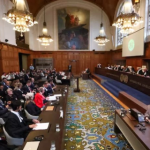ICPAK, in response to the Finance Bill 2024, has raised concerns regarding several proposed measures that could significantly impact Kenyans if implemented unchanged. Among these are the proposed VAT on bread, motor vehicle tax adjustments, and VAT on banking and insurance services.
Of particular concern is the proposal to reclassify the supply of ordinary bread from zero-rated to standard-rated VAT. This change would result in an increase in the price of bread, which is a staple food for many Kenyans.
ICPAK highlighted that the demand for baked products has been increasing globally, with projections indicating a 13% growth by 2025. This suggests that any increase in the price of bread could have a substantial impact on consumers.
“The Institute is of the opinion that the government should retain bread and other related wheat products as zero-rated to make them affordable to the majority of Kenyans who are still grappling with the high cost of living,” ICPAK said.
ICPAK has expressed concerns about the proposed motor vehicle tax outlined in the Finance Bill. Under this proposal, a tax of 2.5% of the vehicle’s value would be levied, to be collected by insurers at the point of issuing motor vehicle insurance.
The tax amount would range from a minimum of Ksh. 5,000 to a maximum of Ksh. 100,000, depending on factors like the vehicle’s make, model, engine capacity, and year of manufacture.
ICPAK warns that this tax would compound the financial burden on vehicle owners, particularly considering recent adjustments to insurance premium rates and the already high fuel prices in Kenya. The additional cost of operating motor vehicles in the country could have significant implications for individuals and businesses alike.
“This will have a negative impact on the transport and logistics industry who may opt to pass through the additional cost to their customers thus escalating cost of living through a multiplier effect not only to Insurance companies, Spare-part dealers, car-service dealers, local assemblers, importers but also to common wananchi who use motor vehicles. It is also important to note that the motor vehicle tax, unlike advance tax on commercial vehicles, cannot be offset against income tax payable,” ICPAK asserted.
ICPAK has raised concerns about several proposed amendments in the Finance Bill 2024, including the increase in Excise Duty from 15% to 20% on telephone and internet data services, as well as fees for money transfer services and cellular phone transfer services.
The institute warns that these new charges could potentially reduce the number of transactions and, consequently, lead to a decrease in Excise Duty collection.
Additionally, ICPAK has called for adequate funding of counties in compliance with Article 219 of the Constitution, which demands the timely transfer of equitable shares without deduction.
The institute emphasizes the importance of full transfer of functions and proper costing to ensure sufficient funding for devolved functions.
However, ICPAK has welcomed several proposals in the Finance Bill, including the introduction of a minimum top-up tax to align with international tax regimes, revisions to Daily Subsistence Allowance and meal allowance limits, and increases in non-taxable benefits thresholds and pension contribution limits.
Furthermore, ICPAK supports the introduction of Significant Economic Presence Tax, increases in pension contribution limits, and the treatment of contributions paid for Affordable Housing Levy and SHIF as allowable deductions.
Additionally, the exemption of business transfers as a going concern from VAT has been welcomed.
The Finance Bill 2024, published on May 9, 2024, proposes various amendments to several tax-related acts and was tabled before the National Assembly on May 13, 2024.
Parliament has invited the public to submit comments on the bill by May 28, 2024, before it is approved and assented into law in June.
Despite dissent from Kenyans, who are asking MPs to reject the bill and make amendments favorable to taxpayers, its fate remains uncertain.



